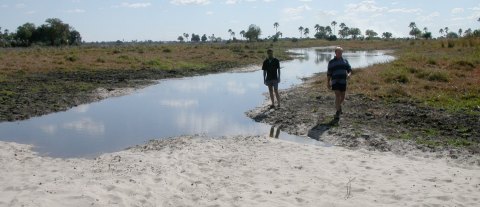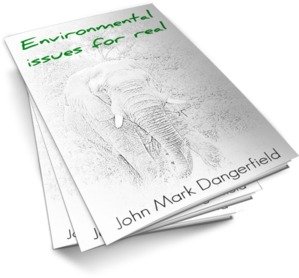Home | About CCW | Contact Us | Climate change Meaning | Causes | Solutions | Emissions | Carbon trading
Heat waves
Heat waves are a relative thing. They are periods of weather that are hotter and last longer than is normal for the area.
Three weeks of 38 degrees Celsius days in summer would not be unusual in Gaborone, Botswana as such weather is fairly normal between December and February most years.
Three weeks of 38 degrees Celsius days in a London summer would be so unusual people would think that the world was about to end. The papers would be saying ’this heat will kill us all’.
How long unusually warm weather must last before it can be called a heat wave also depends on the area but it is commonly several days to a few weeks

even the beach can be a challenge when its really hot
Heat waves are often associated with humid conditions because we feel the heat more when our personal cooling system, sweat, is compromised. We loose excess heat from our bodies as sweat evaporates from the surface of the skin, a process that is far less efficient when the air is already saturated with moisture.
Heat waves are caused by the persistence of high-pressure cells in the atmosphere that are associated with cloudless skies and no rain. They also occur when warm air masses move into areas where the air is normally cooler.
Humans are quite good at getting used to the prevailing weather – the technical term is acclimation. This is why people from the north of Scotland can go about in shirt sleeves while visitors from the south must wear fleeces and gortex jackets on the moorlands and islands even in summer.
A visitor having to wear thermal jackets tells us that we are less good at coping with rapid temperature change or unusual temperatures, especially warmer ones.
When it gets cold we have options. We can add some layers of clothing or sit closer to the fire.
Extreme heat accounts for more deaths than floods, cyclones and wild fires put together – more than 2,000 in the decade from 1992 in the US alone.
This is because heat affects the elderly, young and those who are already sick, especially those taking medications that affect sweating and moisture retention in the body.
As well as these direct effects, extreme hot weather can also disrupt our social and economic systems, often affecting power supplies when spikes in energy use creates overload on the electricity grid as people turn on air conditioners and fans to try and keep cool.

the Okavango Delta floods during the peak of the dry season when the temperatures are starting to rise — it takes several months for the water to arrive from the heavy summer rains in Angola — two days later this channel was navigable by boat
Heat waves and climate change
A climate change effect is that periods of extreme heat are likely to be more frequent, more intense and occur in new places.
Most climate models suggest that with more energy in the atmosphere-ocean system, high-pressure cells will be buffeted by the jet stream more often or held over an area for longer than in the past.
The consequences of this global warming effects will depend on where and when the effect occurs.
Extending periods of hot weather in Jakarta, where tropical conditions are part of everyday life, may be less of a challenge than severe summer heat in Toyko even though they have similar population sizes (around 9 million).
Even if there were no climate change effect, hot weather will affect more and more people around the world because
- every day there are more of us
- in many countries the population is aging
- most of us are living longer
- we are more crowded than we used to be
Even though more and more of us have modern shelter, electricity and running water we are still somewhat exposed. It is hard to hide from unusual warmth, especially if it comes on in a hurry.
The conundrum
The media will be quick to blame climate change for heat waves and the health consequences that go with them.
Except that the numbers of people at risk from severe weather grows by the day as our populations pass through the demographic bubble and life expectancy lengthens.
We should be very cautious about attribution of any discomfort from hot weather to climate change.
More reading from CCW
Environmental Issues for Real by Dr J. Mark Dangerfield looks at some of the obvious, and some of the not so obvious, challenges for a growing human population living as we do in a finite world.
Only this time it's not about the impending disasters or the guilt or the blame.
This time, it’s 10 brief essays that are about the bigger picture. In less than an hour you could glimpse something different, a view that we can only see when we take a fresh look.
Download your copy at Smashwords
Back to top of Heat waves |Back to Climate change effects | Back to Climate-change-wisdom home

cockatoo takes a drink from a fire bucket
Recent Articles
-
Reducing emissions while looking for solutions...
Nov 01, 15 04:46 PM
I've seen a lot of post's online for ideas on reducing emissions. The one suggestion I have not seen, is the most obvious. There should be a government -
Climate change evidence
Mar 24, 15 06:22 AM
Real climate change evidence has to demonstrate a change in climate. An extra sunny day or a severe storm or a flood is not enough. -
The climate change effect
Feb 19, 15 03:08 AM
What will be the climate change effect? There isn't one, there are many. Perhaps too many for us to understand.


New! Comments
Have your say about what you just read! Leave me a comment in the box below.